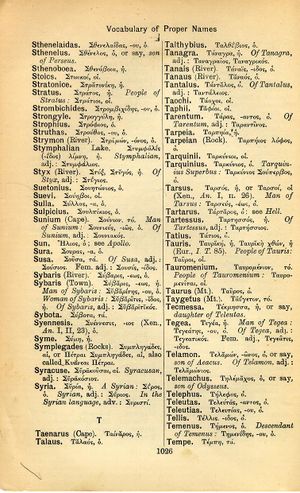Sthenelus
Μακάριος, ὅστις ἔτυχε γενναίου φίλου → Generosa amicus mente , felicis bonum → Glückselig ist, wer einen edlen Freund gewinnt
English > Greek (Woodhouse)
Σθένελος, ὁ, or say, son of Perseus.
Latin > English (Lewis & Short)
Sthĕnĕlus: i, m., = Σθένελος.
I King of Mycenœ, son of Perseus, and father of Eurystheus, Hyg. Fab. 244.—
II King of the Ligurians, father of Cycnus, who was changed into a swan, and who, from his father, is called proles Stheneleïa, Ov. M. 2, 367; cf. sqq.—
III One of the Epigoni, charioteer of Diomede at the siege of Troy, and one of those shut up in the wooden horse, Verg. A. 2, 261; Hor. C. 1, 15, 24; 4, 9, 20.—
A Rutulian, slain by Pallas, Verg. A. 10, 388.—Hence.
A Sthĕnĕlēĭus, a, um, adj., Stheneleian.
(a) (Acc. to I.) Eurystheus, Ov. M. 9, 273: hostis, i. e. Eurystheus, id. H. 9, 25.—
(b) (Acc. to II.) Proles, i. e. Cycnus, Ov. M. 2, 367.—
B Sthĕnĕlēis, ĭdis, adj. f., Stheneleian: volucris, i. e. Cycnus, Ov. M. 12, 581.
Latin > French (Gaffiot 2016)
Sthĕnĕlus,¹⁴ ī, m. (Σθένελος),
1 fils de Capanée, un des chefs grecs au siège de Troie, compagnon de Diomède : Virg. En. 2, 261 ; Hor. O. 1, 15, 24 ; 4, 9, 20
2 fils de Persée et d’Andromède, père d’Eurysthée : Hyg. Fab. 244
3 roi de Ligurie, père de Cycnus, changé en cygne : Ov. M. 2, 367 || -lēĭus, a um, de Sthénélus : Ov. M. 9, 273 ; hostis Ov. H. 9, 25, Eurysthée || -lēĭs, ĭdis, f., de Sthénélus : Ov. M. 12, 581.

